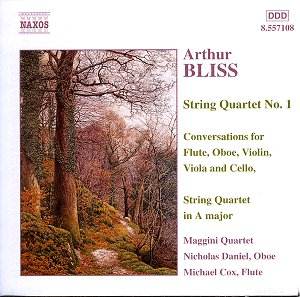Bliss is among the least known of the British composers
of the 20th century. Yet he is always worth exploring. He composed music
in all the important genres, but was perhaps at his best when handling
instrumental ensembles, either the orchestra or chamber groups. It is
therefore promising that the spine of this Naxos issue contains the
description 'Volume 1'.
Of the three works featured here, the earliest is the
Quartet in A major, which was composed during 1915 when Bliss was serving
on the Western Front. Whether the music was actually composed 'in the
trenches' or on leave we do not know. What is for certain is that, along
with all the other works of the first phase of his creative life, the
composer withdrew it.
However, the music is well written and excellently
played and recorded. The Maggini Quartet, in their continuing series
of English chamber music recordings for Naxos, are setting high standards
and performing the worthwhile service of bringing repertoire to wider
attention that deserves such coverage (one thinks also of the Bax quartets).
The A major Quartet particularly reflects an Elgarian
influence, as one might expect. In fact Bliss was absent from the London
premiere in November 1915, and Lady Elgar wrote to him to explain how
she found the music 'full of eager life and exhilarating energy and
hope'. Already Bliss displays a sure control of instrumental writing
and of subtle textures, and the work is well worth performing.
The Conversations for winds and strings were
written soon after the end of the Great War, and this time the influence
is probably Parisian. In the French capital Bliss had met members of
Les Six, and was much encouraged by their vivacity and modernism. When
his own music, these Conversations, was introduced in London,
the programme also included pieces by Tailleferre, Milhaud and Poulenc,
a fact which pleased Bliss considerably. There are five titled movements
lasting some fifteen minutes, and the wind players change occasionally
from flute to alto flute, and from oboe to cor anglais. The balances
with the strings are expertly and wittily handled, while the concept
relies greatly on the dexterity of the players. The fact that this performance
features the artistry of Michael Cox and Nicholas Daniel is therefore
a bonus, enhancing the quality of what is already a bargain.
The most substantial, and the best of the three works
is the Quartet No. 1. This dates from altogether later in the composer's
career, when like Benjamin Britten he settled in the United States before
war broke out in 1939. It was commissioned by the great American patroness
Elizabeth Sprague Coolidge and first performed in 1941, shortly before
Bliss returned to Europe. The London premiere followed soon after, performed
by the Griller Quartet at a National Gallery concert. There are four
movements, the slow movement positioned third, and they make up an admirably
balanced whole. This is altogether a more substantial and finished composition,
the contrasts and tensions justifying the time-scale in every way. The
Maggini performance is eloquent and has abundant subtleties, the latter
a tribute to the recording too.
With excellent documentation too, this is an interesting
and worthwhile issue in every way.
Terry Barfoot


